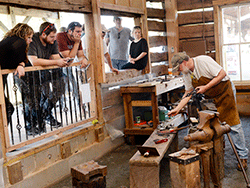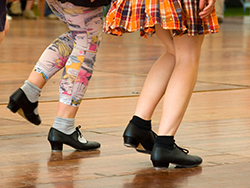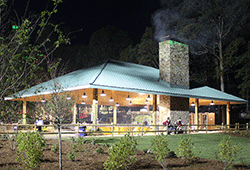
Don't let the relaxed atmosphere of Heritage Circle fool you, the nook near the Flower Show has some of the most hard-working people at the N.C. State Fair. There is plenty of activity at the circle, from the crew maintaining the tobacco barn during the fair to the craftsmen demonstrating their traditional methods of woodcarving, blacksmithing and chair-building. Visitors can also enjoy the taste of homemade ice cream, apple cider, seafood, down-home cooking, or a hush puppy from the Old Grist Mill as they listen to the sweet melodies from the Bluegrass Stage.
The exhibit area is open daily from 9 a.m. to 9:45 p.m., except on Thursday, Oct. 12, when Heritage Circle will open at 12 p.m.
Church in Heritage Circle
|
The Campers on Mission host a variety of entertainment daily at 12:30, 1:45, 3 and 4:15 p.m. Church services will be held on Sunday mornings at 8:30 and 11 a.m. The organization also provides food and services to carnival workers. |
Cider House
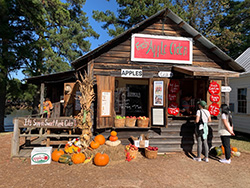 |
We're all about learning that is fun...for a bit of that, the Heritage Circle Cider House is bringing both this year! Head over to see 5th generation apple farmers from Hendersonville, NC! Bright Branch Farms grows and produces over 100 acres of apples and also presses fresh cider at the farm...and now they're bringing that magic to us right here in Raleigh!
|
Flue Cured Tobacco Barn
 |
Come to Heritage Circle and see the working tobacco barn as volunteers cure tobacco the old-fashioned way.
The barn will be filled on Friday, Oct. 13, from noon until about 5 p.m. The leaves will be strung on sticks and hung in the barn the same way it was done across North Carolina for generations. Everyone is welcome to help!
At 2 p.m. on Friday, Oct. 13, a stringing contest sponsored by John Deere Ice Cream, will name the state champion. Grab some friends and join the competition. Entry and practice time will be Oct. 14 from 10 a.m. - 2 p.m. while the barn is being filled.
After the barn is loaded, the tobacco will be cured by a wood fire for seven days. Fairgoers can take a peek inside the barn to see the process. After it is cured, visitors will be allowed to go inside and see the result of the hard work. |
Heritage Forge
|
At more than a century old, the Heritage Forge was assembled from barns donated in 2016 by Agriculture Commissioner Steve Troxler. The demonstration area is constructed of wormy chestnut logs estimated to be more than 200 years old. The logs originally were used as a feed barn. The sales area was constructed from pine that came out of a tobacco pack house dating to the early 20th century. The reclamation project also extended to the flooring on the shop's porch and in the sales area. It's red oak salvaged from Duke Forest and Meredith College.
The demonstration area contains a double forge, which state and local blacksmith guilds will operate during the Fair. |
Folk Festival
|
Talented dancers and musicians from across North Carolina compete for ribbons and plaques, which will be awarded to the individual or group that best exemplifies North Carolina’s musical heritage. This 5-day competition features performances ranging from old-time bluegrass music to high-energy clogging and traditional square dancing.
Many groups take traditional dances and mix them with contemporary costumes and music to appeal to younger generations. Judging is based on audience appeal, authenticity, appearance, enthusiasm and competency.
|
Old Grist Mill
Experience a historic, working grist mill and get a delicious hush puppy sample.
A gristmill (also: grist mill, corn mill or flour mill) grinds grain into flour. The term can refer to both the grinding mechanism and the building that holds it.
Although the terms "gristmill" or "corn mill" can refer to any mill that grinds grain, the terms were used historically for a local mill where farmers brought their own grain and received back ground meal or flour, minus a percentage called the "miller's toll." Early mills were almost always built and supported by farming communities and the miller received the "miller's toll" in lieu of wages. Most towns and villages had their own mill so that local farmers could easily transport their grain there to be milled. These communities were dependent on their local mill as bread was a staple part of the diet. |
|
Bowles House
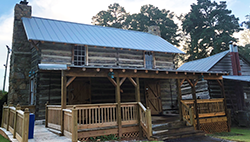 |
Dating back to the 1850, the Thomas Bowles House came to us from Alamance County. The house will showcase tobacco farming antiques and our tobacco hand-tie competition. |
School House
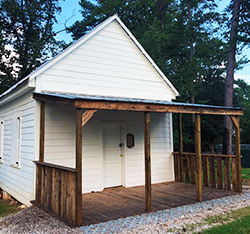 |
This historic school house from Lizard Lick serves as the home base of Carden Farms bringing you hand-carved wooden log hogs, deer and other critters, rustic arbors and metal folk art. |
Tobacco Pavilion
|
With plenty of picnic tables and a roaring fire, the Tobacco Pavilion is the perfect place to enjoy a quiet moment away from the hustle and bustle of the Fair. Make sure you grab an apple dumpling or a warm cup of cider on your way down! |





